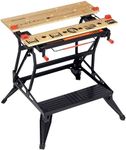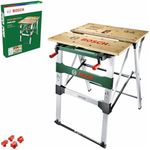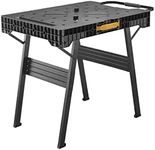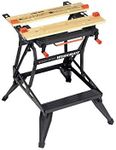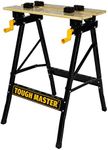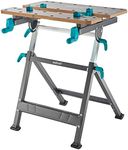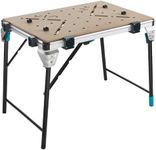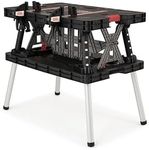Buying Guide for the Best Portable Workbenches
Choosing the right portable workbench is crucial for anyone who needs a versatile and mobile workspace. Whether you're a DIY enthusiast, a professional contractor, or someone who occasionally needs a sturdy surface for projects, a portable workbench can be a valuable tool. The key is to find a workbench that suits your specific needs, considering factors like stability, portability, and the type of work you'll be doing. Understanding the key specifications will help you make an informed decision.Weight CapacityWeight capacity refers to the maximum load a workbench can support. This is important because it determines what kind of projects you can undertake on the bench. If you plan to work with heavy materials or tools, you'll need a workbench with a higher weight capacity. Typically, workbenches can support anywhere from 200 to 1000 pounds. For light DIY projects, a lower capacity may suffice, but for professional use, aim for a higher capacity to ensure safety and functionality.
PortabilityPortability is a measure of how easy it is to move and transport the workbench. This is crucial if you need to frequently move your workspace or if you have limited storage space. Portable workbenches often come with features like folding legs, wheels, or handles. Consider how often you'll need to move the bench and choose one that balances ease of transport with stability. If you need to carry it to different job sites, a lighter, more compact model might be ideal.
Work Surface SizeThe work surface size is the area available for you to work on. This is important because it affects how much space you have for your projects. Workbenches come in various sizes, from compact models with a small surface area to larger ones that offer more space. Consider the types of projects you'll be working on and how much space you'll need. If you work on large projects or need space for multiple tools, opt for a larger surface. For smaller tasks or limited space, a compact workbench might be more suitable.
MaterialThe material of the workbench affects its durability, weight, and suitability for different tasks. Common materials include wood, metal, and plastic. Wooden workbenches are sturdy and provide a traditional feel, but they can be heavy. Metal workbenches are durable and often lighter, making them easier to transport. Plastic workbenches are lightweight and resistant to weather, but may not be as durable for heavy-duty tasks. Consider the environment you'll be working in and the type of projects you'll undertake when choosing the material.
AdjustabilityAdjustability refers to the ability to change the height or configuration of the workbench. This is important for ensuring ergonomic comfort and versatility in different tasks. Some workbenches offer adjustable legs or surfaces, allowing you to customize the height to suit your needs. If you plan to use the workbench for various types of projects or share it with others, an adjustable model can provide the flexibility you need. Consider how important it is for you to have a customizable workspace when making your choice.

